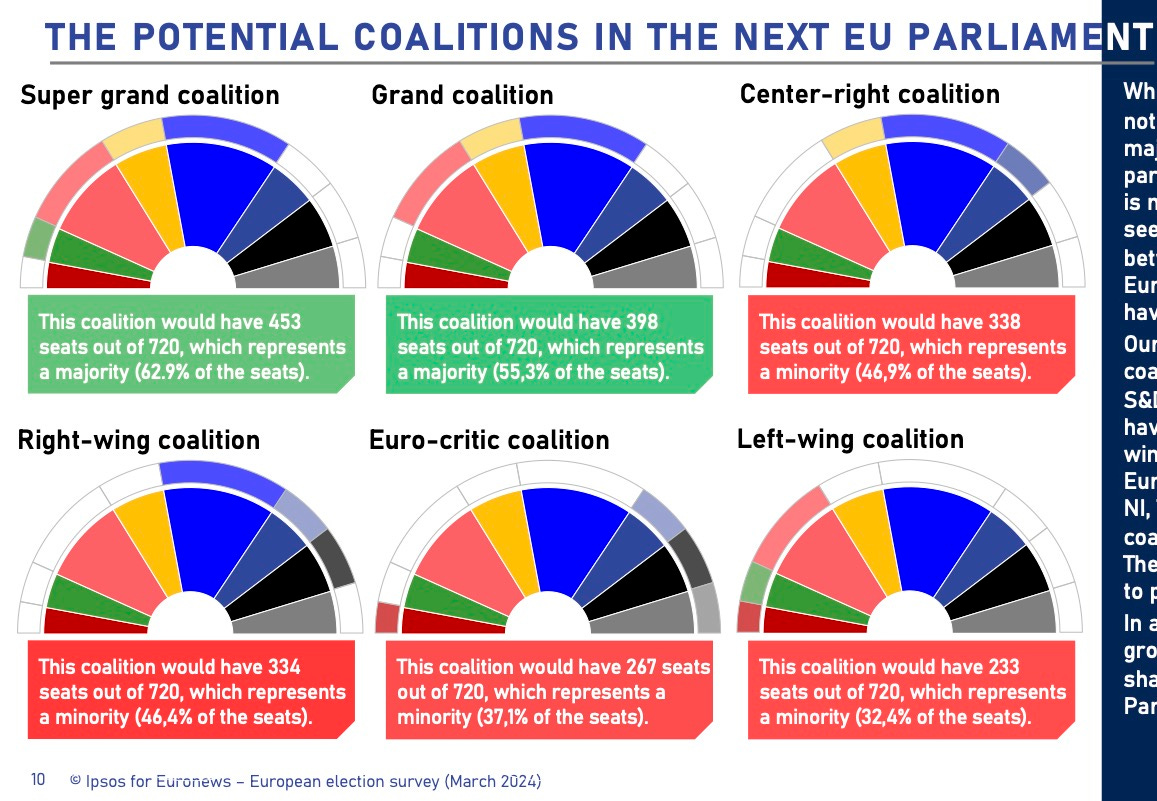Europe's far right problem is nothing compared to America's
There will be no "surge" in far right seats in the European Parliament. But there is likely to be a normalisation of the far right after Sunday's election, and that is the danger.
As we begin the first day of voting in the 2024 EU election, there is no getting around the big story: the rise of the European far right. It’s real, and it’s troubling. But at the same time, many news articles - particularly in the Anglosphere - seem to be exaggerating the situation in a way that is actually misdiagnosing the danger. What’s happening in the European Union is not the same as what’s happening in the United States. This is not “Europe’s Trump moment” as American news outlets are claiming. The situations are extremely different, and their dangers will manifest in divergent ways over the coming months. One situation is far far more dangerous than the other.
The European situation
First off, we need to be clear about what we mean by the “rise” of the European far right. What we’re talking about here is, for the most part, a rise in political power rather than a major rise in actual votes. According to pan-European polling conducted by Ipsos for Euronews in March, which has been the most comprehensive of the campaign, the European Parliament’s two far-right groups are expected to increase from 18% of parliament seats during this past 2019-2024 term to 21.8% in the next term. But since then, Marine Le Pen’s ID group has kicked out Germany’s AfD, so in fact we can expect it to be around 20%.
A rise of 2% ’aint no surge. In fact, it’s completely in line with the trajectory of the far right’s growth in the European Parliament in the elections every five years over the past two decades:
2004: 8.7%
2009: 11.8%
2014: 15.7%
2019: 18%.
In other words, this is a long-term trend that people only seem to be noticing now. It escaped almost everyone’s attention in 2014 when far-right parties came first in the EU election in both France and the UK that year (and again in France in 2019, which makes all the hand-wringing about Le Pen’s party coming first for a third time in 2024 all the more bizarre).
The mainstream EPP (center-right), S&D (center-left) and Renew (centrist Liberal) parties are all projected to lose seats, but they are still expected to have enough to comfortably form a majority according to the Ipsos poll. That being said, we could be in for surprises on Sunday in which they fall short. The much-talked-about scenario of a right-wing EPP-ECR-ID majority coalition remains unlikely but possible.
But it’s the possible part that is scaring people, because it’s never been a possibility before. Since elections began in 1979, the European Parliament has always been under the control of a centrist coalition of EPP and S&D, sometimes also with the Liberals. Three developments have converged to get us to where we’re at in 2024. Far right groups will, at the very least, cross a threshold into making up 1/5 of the European Parliament for the first time, which will make them a serious player especially if they decide to unite into a single group as is being pushed by Le Pen. Under Le Pen and Farage’s leadership ID and its previous iterations have, over the past 20 years, been as irrelevant as Sinn Fein in the British Parliament. They’ve barely shown up, because their central platform was that the EU shouldn’t exist. That changed after people saw the effects of Brexit - none of Europe’s far-right parties advocate for their country leaving the EU any more.
ECR, under the leadership of Meloni since 2020, has by contrast taken their jobs more seriously and always had a position that the EU should exist but its powers should be majorly shrunk. The group was founded in 2009 by the center-right British Conservatives and far-right Polish Law and Justice as a breakaway faction from the center-right EPP. Though it has since drifted way to the right and today contains some of Europe’s most notorious far-right parties like the Sweden Democrats and Vox, its origins still give it a veneer of respectability compared to Le Pen’s ID.
And that leads us to the third development: the EPP’s willingness to work with the far right. It would be only natural that the EPP might link up in coalition with the far right in the European Parliament given that their members have done so in several national governing coalitions including in Austria, the Netherlands, Italy, Finland and Sweden (and, if they had won more seats, Spain). EPP president Manfred Weber has been openly courting Meloni, and some EPP members seem to prefer working with her ECR than with the center-left. That’s quite startling given that Meloni’s party, Brothers of Italy, is the successor party to Mussolini’s Fascists. During the lead candidates’ debate last month, President von der Leyen (herself an EPP member) had nothing but praise for Meloni and said she would be open to the EPP allying with ECR. In response, the other centrist groups (S&D, Renew and Greens) signed a resolution promising never to form coalitions with the far right “at European or national level”. Showing they’re serious about that pledge, Renew leader Valerie Hayer has said Mark Rutte’s VVD may be kicked out of Renew for forming a Dutch coalition with Geert Wilders’ PVV.
So, in short, this is not a story about a “surge” for the far right but rather the legitimation of the far right. That’s happening because of new center-right openness, shrewd far-right leaders like Meloni and the polling gains of the past decade. However, a controlling right-wing majority in the European Parliament remains an unlikely scenario, and the reality is that most likely not much will change for EU lawmaking as a result of this European Parliament election if turnout is at its normal 50%. Rather, the change is coming from the national elections which determine the seats in the Council, the upper chamber of the EU’s legislature (equivalent to the Bundesrat in Germany or, more loosely, the Senate in the US). Three of those 27 seats are now occupied by governments which are majority far right (Italy, Hungary, Netherlands). An additional five are governments with the far right as minority member or partner (Finland, Czechia, Croatia, Slovakia, Sweden). And while it may not be new for far right parties to emerge as national winners in the EU election given that so many people use this as a protest vote (note that almost everywhere, the governing party loses), the sheer scale of how many countries this will be the case for in 2024 is quite startling. The map below is particularly disheartening for the center-left S&D, though that is also nothing new. The center-right EPP has dominated European politics for 25 years - in the Parliament, Council and Commission.
The American situation
Look, I’m a journalist too and I know sometimes we need to sex things up. Perhaps I’ve been guilty of this too in the past months as a warning of the *possibility* of a right-wing coalition in the parliament (which, again, is a very real if unlikely scenario if people don’t turn out to vote). I don’t begrudge anyone writing about that very real possibility. But comparing the situation in Europe to what is happening in the US is just nonsense. And unfortunately it’s par for the course for the Anglosphere’s inability to recognise or acknowledge its own nationalist far right.
While 20% of the vote in Sunday’s EU election is expected to go to the far right according to polls, 47% of the vote in the 2016 and 2020 US presidential elections went to the far right - and Trump is currently tied with Biden in the 2024 polls. In the 2022 US Congressional midterm, 51% of seats went to a party that is now dominated by the far right.
This is the fundamental difference, and the reason why Sunday will not be Europe’s “Trump moment”. The situation in Europe is that center-right parties are forming governing coalitions with far-right parties, as a result of their steady growth in power over the past 20 years. The situation in America is that the center-right party was suddenly taken over by the far right in 2016 and remains under far-right control. It is ludicrous to compare that 2016 moment to anything that could possibly happen on Sunday in the EU election.
The far right is not about to take power in Europe. They are entering national governments in increasing numbers, and are expected to come first in six out of 27 member states on Sunday. They are the majority party in governing coalitions in three EU countries and minority partners in five. The far right has outright control of only one EU member state government: Hungary. Contrast this with the US, where there is a 50/50 chance Donald Trump, a twice-impeached convicted felon who has pledged to blow up the international centrist world order, will take power (and perhaps also control Congress). Trump’s Republicans have outright control in half of US state governments (governor and legislature).

It says a lot about the current state of the Republican Party when just this week, Trump confidant Laura Loomer says Trump’s political enemies should get the death penalty if he returns to power. That’s just one in a chorus of Republican voices from Marco Rubio to Ronny Jackson, calling for Trump to use the legal system to go after Democrats in retaliation for his guilty verdict last week. I don’t recall any European far-right politician even calling for their opponents to be locked up, let alone put to death.
It continually astounds me how much hyperbole the American and British media use when talking about the rise of populist nationalism in continental Europe while at the same time downplaying the much more serious situation in America. Europe is not the one electing convicted felons who promise to be a dictator on day one, that’s America. Europe isn’t the one teetering toward civil war, that’s America. The far right hasn’t launched a violent insurrection in any European country, nor has any far-right leader launched a coup to stay in power. That’s America.
The United States is close to meltdown. Europe is not - unless a meltdown in the US triggers a meltdown here. Most likely, barring some extraordinary development, the best case scenario one can hope for in America is managed decline. It is now a very real possibility Donald Trump will again take control of the White House, through democratic means or not. Now unchecked and vengeful, he seems intent on dismantling not only America’s democratic institutions but also NATO and the Breton Woods systems the Western world has relied on. At worst, and yes we need to say this out loud, America may very soon find itself in a state of civil war. We are just not in the same situation here in Europe.
The populist tide that is fuelling the rise of the Trumps, Bolsonaros, Mileis, Wilders, Orbans and Melonis across the Western world is a common affliction. The causes are similar, but the effects are not. In the world’s oldest democracy, archaic state institutions have proven unable to contain the worst outcomes of this tide. But the far right is nowhere near taking power in Europe. Whatever happens on Sunday, Europeans should have their eyes open to where the real dangers lie. The world is not going to change overnight if the European far right has a better-than-expected performance on Sunday. But if far-right Republicans take control in America in November, it’s game over.







